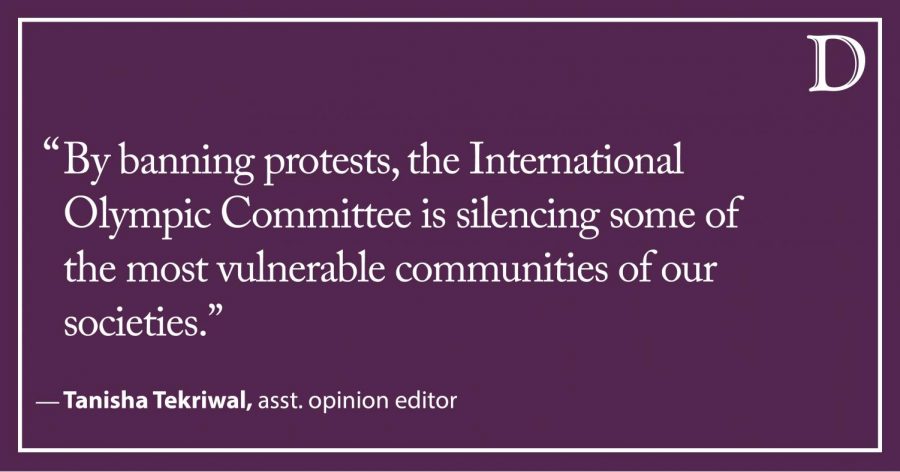Tekriwal: Blaming political problems on sports activism 101
January 26, 2020
For a lesson in hypocrisy or amnesia, we can turn to the International Olympic Committee.
In 1968 Mexico City, John Carlos and Tommie Smith pumped the iconic Black Power salute to protest racial injustice in the United States. The move branded them into the annals of the Olympics which celebrated them… 50 years later in 2018. At the time, they were thrown out of the Olympic Village, suspended from the U.S. team, and both mailed a choice selection of death threats.
Two years since finally giving the athletes their due, the IOC has now added specifics to the Rule 50 banning “any form of political, religious or ethnic demonstrations.” This includes kneeling or raising a fist during opening or closing ceremonies, as well as on the medals podium for the 2020 Tokyo Summer Olympics.
The reason?
“The mission of the Olympic Games is to bring the entire world together can facilitate the understanding of different views, but this can be accomplished only if everybody respects this diversity,” the IOC said in a statement, adding that it is trying to “keep the venues, the Olympic Village and the podium neutral and free from any form of political, religious or ethnic demonstrations.”
The IOC forgets, however, that expressing one’s own views is not equivalent to undermining another’s or disrespecting diversity. Additionally, why must we seek to comfort those whose views align with racism, sexism, xenophobia and supporting wealth inequality? These views don’t amount to a “difference of opinion” on some broad political spectrum. They are simply inhuman.
All the more, being apolitical is political. It is a privilege to stay “neutral” in our tumultuous times. For instance, a white man might decide someday that times are too dangerous and polarized to have his “#BlackLivesMatter” placard in his front yard, while a black woman wears her color and her gender upon her skin every day. Not everyone chooses a politicized lifestyle — it is often thrust upon them.
The IOC seeks to separate sports from politics, but they have always been intricately tied. Every moment that has led up to the Olympic Games has been framed and facilitated by politics — from who decides to play sports to what sports they pursue to which countries are represented or not represented in the Olympics.
More often than not, education is considered a channel for class mobility. However, many don’t have access to that avenue, so sports have been an alternative. For whole swaths of low-income populations, which make up a big portion of the athlete community, some recruiter in the stands might launch their careers, spanning from home grounds to even the Olympics.
When I competed in Karate back in India, it always surprised me how much training my opponents had, how many hours they dedicated to perfecting one move. My coach explained that this was a chance at a career for them — it was a whole livelihood and future pivoted on that one perfect kick that might take them to the next Nationals or World Championships, not some extracurricular picked up and dropped at a whim.
The sport one decides to play can also be half-passion, half-circumstance. Certainly sports which require more expensive and intensive equipment are less likely to see diverse participation. Shooting or gymnastics are not as accessible as basketball or track. Thus, even the kind of sports one decides to pursue can be political.
There was a time when Germany fielded an “all-Aryan” team, and Jesse Owens showed the world his skills, only to return to a segregated America where he and his black colleagues were not even invited to the White House. A time when the IOC didn’t care about South Africa’s apartheid, when the United States boycotted the Moscow Olympics to protest the USSR invasion of Afghanistan.
Today, we have more inclusive,and politically inclined, events like the Paralympics and an Olympic Refugee team. Under the leadership of Thomas Bach, North Korea and South Korea would pitch the unifications of some of their teams for the 2020 Olympics.
So I refuse to sit here and listen to the very same Bach tell us that sports are neutral. They are anything but. By banning protests, the IOC is silencing some of the most vulnerable communities of our societies. Our differences may not magnify or decide the results when we step onto the field anymore, but they are not stripped away either.
People often forget how desperately protesters weigh the myriad directions a simple political gesture could take and the backlash it could face, as well as the sleep they lose deciding if “it is worth it.” People who put their entire lives and livelihoods on the line to draw attention must have serious reasons for doing so. Our goal for society cannot be to successfully stop people from protesting. Rather, it must be to solve the dire problems that compel athletes to use their statuses to protest.
We complain that celebrities are much too passive, so when athletes want to be active, why are we shutting them down? Let us respect the legacy of Carlos and Smith because amnesia makes people forget that the two legends faced exactly what Colin Kaepernick and others face today. Let us honor the memory of Kobe Bryant by giving another “six-year old boy his Laker dream” without asterisks for terms and conditions. Let us, for once, truly level the playing field.
Tanisha Tekriwal is a Weinberg freshman. She can be contacted at [email protected]. If you would like to respond publicly to this op-ed, send a Letter to the Editor to [email protected]. The views expressed in this piece do not necessarily reflect the views of all staff members of The Daily Northwestern.


